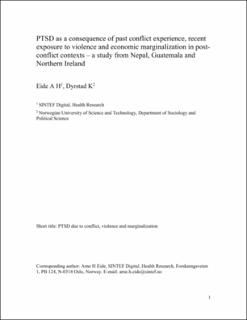| dc.contributor.author | Eide, Arne Henning | |
| dc.contributor.author | Dyrstad, Karin | |
| dc.date.accessioned | 2020-05-06T07:27:04Z | |
| dc.date.available | 2020-05-06T07:27:04Z | |
| dc.date.created | 2019-07-02T12:46:14Z | |
| dc.date.issued | 2019 | |
| dc.identifier.citation | International Journal of Social Psychiatry. 2019, 65 (6), 488-495. | en_US |
| dc.identifier.issn | 0020-7640 | |
| dc.identifier.uri | https://hdl.handle.net/11250/2653412 | |
| dc.description | Postprint version of published article. Original available at http://dx.doi.org/10.1177/0020764019858122 | en_US |
| dc.description.abstract | Background:
Exposure to war and conflict increases the risk of mental health problems. Poor living conditions are known to negatively impact mental health.
Hypothesis:
It is hypothesized that exposure to negative events after armed conflict interacts with past negative experiences, socioeconomic factors and current mental health problems.
Methods:
A cross-sectional survey was carried out in three contexts of previous internal armed conflict: Nepal, Guatemala and Northern Ireland. Three nationally representative samples were drawn, comprising a net sample of 3,229 respondents.
Results:
Both recent negative events and past negative events linked to the previous conflicts were found to be associated with elevated risk of post-traumatic stress syndrome (PTSD). Economic marginalization and urban residency also contributed to current risk of PTSD.
Conclusions:
The results support the study hypothesis that both past and recent negative events in combination with economic marginalization contribute to explain current risk of PTSD. It is necessary both to improve living conditions more broadly and to establish and develop health services that have the capacity to screen, prevent and treat mental health problems also in poor contexts, in particular against a background of previous armed conflict. | en_US |
| dc.language.iso | eng | en_US |
| dc.publisher | Sage | en_US |
| dc.subject | Mental health | en_US |
| dc.subject | PTSD | en_US |
| dc.subject | Conflict exposure | en_US |
| dc.subject | Violence | en_US |
| dc.subject | Economic marginalization | en_US |
| dc.title | PTSD as a consequence of past conflict experience, recent exposure to violence and economic marginalization in post-conflict contexts: A study from Nepal, Guatemala and Northern Ireland | en_US |
| dc.type | Journal article | en_US |
| dc.type | Peer reviewed | en_US |
| dc.description.version | acceptedVersion | en_US |
| dc.source.pagenumber | 488-495 | en_US |
| dc.source.volume | 65 | en_US |
| dc.source.journal | International Journal of Social Psychiatry | en_US |
| dc.source.issue | 6 | en_US |
| dc.identifier.doi | 10.1177/0020764019858122 | |
| dc.identifier.cristin | 1709340 | |
| cristin.unitcode | 7401,90,25,0 | |
| cristin.unitname | Helse | |
| cristin.ispublished | true | |
| cristin.fulltext | original | |
| cristin.fulltext | postprint | |
| cristin.qualitycode | 1 | |
